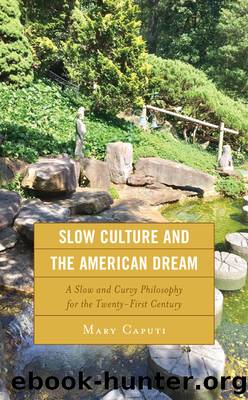Slow Culture and the American Dream by Mary Caputi

Author:Mary Caputi
Language: eng
Format: epub
Publisher: Lexington Books
Published: 2022-01-15T00:00:00+00:00
Noah, the Water-Logged Patriarch
Prometheusâ daring and self-determined risk-taking contrast sharply with Noahâs submissive obedience to Godâs command. Noah is the venerable Old Testament patriarch whose dates are ambiguous, as is the question of whether the Biblical flood occurred at all. Among those who study the Old Testament and/or see evidence of the floodâs existence, this diluvian event that changed the course of history took place somewhere around 2348 BC; thus, about 4,370 years ago.13 And whether an ark filled with animals floating amidst a downpour represents an historical reality or an allegorical lesson, the person of Noah surely occupies a secure space within the Western tradition. He is the one chosen to take humanity into the redeeming waters that promise a new beginning; he lets us wash away the past and start over again with a clean slate.
Noah was a devout man living in a time of waywardness such that his benevolence contrasted markedly with the misconduct of his contemporaries. Unwaveringly devoted to God, he âfound favor with the Lordâ even as the rest of the world did not: âIn the eyes of God the earth was corrupt and full of lawlessness.â14 Thanks to Noahâs steadfast devotion, he and his family alone were spared in Godâs decision to wipe out humanity with a flood. He was thus assigned the task of building an ark in order to safeguard Godâs creation and withstand the deluge, orders which he followed dutifully despite their being unusual and uncomfortable. Whereas Prometheusâ signature gesture is one of defiance in the interest of human progress moving forward, Noahâs is one of obedience so that humanity can go back and start over. For in keeping with the Old Testamentâs account, a torrential flood drenched the earth leaving Noah and his entourage adrift for a very long time.
Scholarly interpretations of the floodâs duration vary widely, but there is agreement over Noah and his entourage having spent just over one year in the ark.15 During this time, Noah endures the tribulations of an enclosed space surrounded by animals large and small, unsure how it all will end.16 Far from seeking to master nature, he is immersed in the animal kingdom, besieged by animal needs, overwhelmed by animal behaviors, sounds, and smells. His own willpower or decision to act never enters the equation. Noah does not control the waters but simply follows orders by working with the flood; far from seeking to enrich or embellish life, his only ambition is to keep himself and his charges alive. Indeed, he is not an individual with strong willpower: following the flood, he plants a vineyard and learns the pleasures of wine. One day he indulges this oenophilia to excess and falls asleep, ânaked inside his tent,â causing his sons to cover him with a robe.17 Artists such as Michelangelo and Pietro Liberi have portrayed this intimate familial scene of dutiful sons coming to the aid of their inebriated, incapacitated father.
While still in the ark, however, Noah exhibits sober vigilance, patiently waiting for a sign indicating that God has ended the flood and made the natural world hospitable.
Download
This site does not store any files on its server. We only index and link to content provided by other sites. Please contact the content providers to delete copyright contents if any and email us, we'll remove relevant links or contents immediately.
The Secret History by Donna Tartt(19058)
The Social Justice Warrior Handbook by Lisa De Pasquale(12187)
Thirteen Reasons Why by Jay Asher(8894)
This Is How You Lose Her by Junot Diaz(6877)
Weapons of Math Destruction by Cathy O'Neil(6267)
Zero to One by Peter Thiel(5789)
Beartown by Fredrik Backman(5737)
The Myth of the Strong Leader by Archie Brown(5500)
The Fire Next Time by James Baldwin(5432)
How Democracies Die by Steven Levitsky & Daniel Ziblatt(5216)
Promise Me, Dad by Joe Biden(5144)
Stone's Rules by Roger Stone(5081)
A Higher Loyalty: Truth, Lies, and Leadership by James Comey(4954)
100 Deadly Skills by Clint Emerson(4921)
Rise and Kill First by Ronen Bergman(4780)
Secrecy World by Jake Bernstein(4742)
The David Icke Guide to the Global Conspiracy (and how to end it) by David Icke(4709)
The Farm by Tom Rob Smith(4502)
The Doomsday Machine by Daniel Ellsberg(4485)
